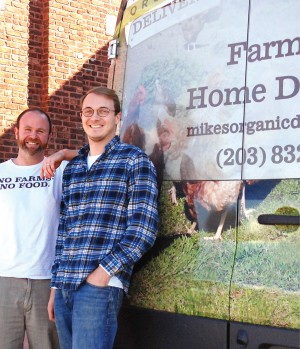Stamford organic delivery links farms to consumers
When Mike Geller was 29 years old, he reached a crossroads in his life. After years in the media and entertainment industries, he quit and left his home in Greenwich to live in the Kalahari Desert for more than three months.
“I completely reconnected with nature,” he said.
He arrived in Africa disenchanted with the U.S. food system, particularly, he recalls, after reading about a company that found a way to make ground beef deemed only suitable for dog food eligible for school lunches through a chemical process involving ammonia.
“I am all for making money and capitalism, but I couldn”™t wrap my mind around it,” he said.

- Mike Geller with associate Chris Kimball outside the Mike”™s Organic Delivery warehouse. Photo by Reece Alvarez
This small insight into the food system, combined with finding some of the best produce he had ever had in a Botswana market, helped propel Geller into a whole new career and industry ”” taking the plunge as an entrepreneur in the local, sustainable food movement.
“At that point, I had an epiphany; I wanted to learn about food. I went to lectures, read books; I immersed myself in this whole sustainable farming culture of the Northeast,” he said. “I came back here and said ”˜No more.”™”
After more than six years, Geller”™s Stamford-based food delivery service, Mike”™s Organics Delivery, is connecting farmer”™s fields to the doorsteps of consumers and he”™s making money doing it.
Within a 50-mile radius from his Stamford warehouse, Geller and two full-time workers associates pick up sustainably and organically farmed produce and meat from more than two dozen farms in Connecticut and New York before packaging and delivering customers”™ orders within days of the produce being pulled from the ground.
The company makes more than 400 deliveries per week and has reached an estimated $1 million in sales per year, Geller said.
With a $25,000 inheritance, Geller started the company from his parents”™ home in Greenwich, delivering eggs with his Nissan Pathfinder. The company has now grown to include five commercial delivery vehicles and expanded its sourcing to include wild fish stocks from Alaska, organically grown nuts from California and other produce not found on the East Coast.
Geller and his workers visit and research the farms they work with extensively, from the way animals and produce are raised and grown to the working conditions for the farm hands. The foundation of his company rests on relationships with the farmers, Geller said.
“They”™re people, not suppliers; they are friends and family, they are people we see every week,” he said. “That connection with them allows us to truly establish that bridge between the consumer and farmer.”
His goal is to reach more than 1,000 deliveries per week and increase sales to $5 million annually.
Geller said he has been approached by investors and frequently hears he should expand to other regions, but there is more than money created through the company.
“You can”™t just throw money at this, authenticity is extremely important,” he said. “We all believe it is our responsibility to help our community. We all grew up in this area.”
Integrity is as much a part of what Geller sells as the produce itself, and both are based on the relationship with the farmer.
“The two words we use all the time are transparency and connection,” he said. “If you look at our food system as it is, those are the things that we”™ve lost.”
Geller and company participate in a number of community outreach programs, from educational presentations and gardening demonstrations for young students to donations to local charitable organizations like Neighbor to Neighbor and Kids in Crisis.
In keeping with his commitment to the community, Geller intends to grow his business in Fairfield County and is expecting “exponential” growth in the industry, citing trends toward online grocery shopping and the erosion of trust in big-name competition.
“The premise of going to the store, that model has to change. In most businesses, you are worried about the big guy coming and knocking you out. In this instance, it is harder for that to happen because people don”™t trust the big guy,” he said. “Competition-wise, I am aware and always looking, but not terribly concerned.”